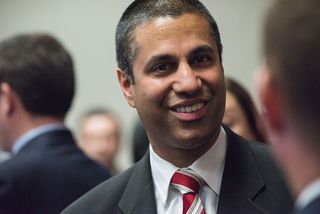FCC chairman Ajit Pai claims net neutrality hurts the sick and disabled
A blatant lie.

Fighting to keep net neutrality rules in place is a massive uphill battle, in large part because it's become tied to partisan politics. But there's also a lack of knowledge and overall understanding of net neutrality, and what's at stake, outside of tech savvy circles. To make things even more difficult, FCC chairman Ajit Pai and others who support dismantling the rules are making the claim that getting rid of existing rules will ultimately help healthcare services.
This interesting (and outright false) tidbit was brought to attention by Motherboard, which highlighted remarks Pai recently made at a Project GOAL conference.
"One aspect of this proposal I think is worth highlighting here is the flexibility it would give for prioritizing services that could make meaningful differences in the delivery of healthcare. By ending the outright ban on paid prioritization, we hope to make it easier for consumers to benefit from services that need prioritization—such as latency-sensitive telemedicine. Now, we can’t predict exactly which innovations entrepreneurs will come up with. But by replacing an outright ban with a robust transparency requirement and FTC-led consumer protection, we will enable these services to come into being and help seniors," Pai said (PDF).
The argument is that by disallowing ISPs to charge extra to prioritize certain traffic, consumers are harmed, in particular the sick and disabled who rely on certain healthcare services. 'Think of the sick!', in other words.
But here's the thing. As currently implemented, the FCC's net neutrality rules already take this into consideration. The FCC under previous chairman Tom Wheeler differentiated between "Broadband Internet Access Services (BIAS)," which is general Internet traffic, and "Non-BIAS data services." The latter is given prioritized, isolated capacity to ensure lower latency, faster speed, and greater reliability. Critical healthcare services—pacemakers, telemedicine, and so forth—fall into this category and are exempt from the rules.
The FCC doubled down on the healthcare claim in a document of supposed myths and facts (PDF) related to net neutrality.
"MYTH: This will result in 'fast lanes' and 'slow lanes' on the internet that will worsen consumers’ online experience.
PC Gamer Newsletter
Sign up to get the best content of the week, and great gaming deals, as picked by the editors.
FACT: Restoring Internet freedom will lead to better, faster, and cheaper broadband for consumers and give startups that need priority access (such as telehealth applications) the chance to offer new services to consumers."
There are several other entries that highlight the other side of the argument. One of the claims is that broadband providers will not charge a premium to reach certain content online. As the FCC spells it out, this didn't happen before net neutrality rules were put in place, so it won't happen after. Given that the FCC is very likely to vote in favor of Pai's proposal next week, we hope that turns out to be true.
Paul has been playing PC games and raking his knuckles on computer hardware since the Commodore 64. He does not have any tattoos, but thinks it would be cool to get one that reads LOAD"*",8,1. In his off time, he rides motorcycles and wrestles alligators (only one of those is true).
Most Popular






